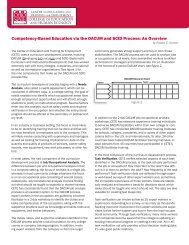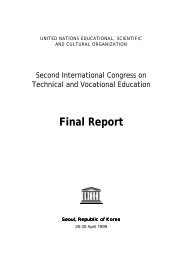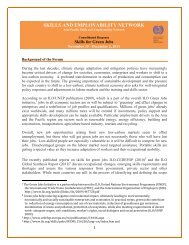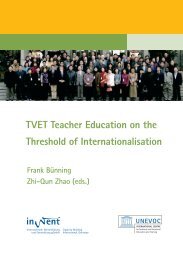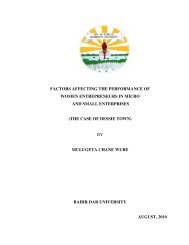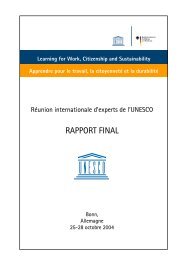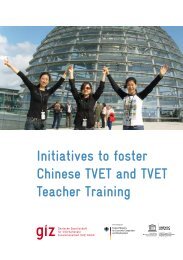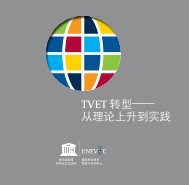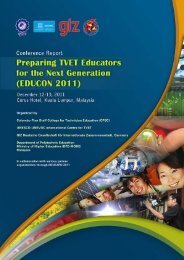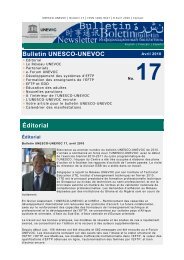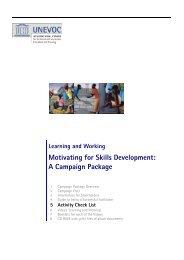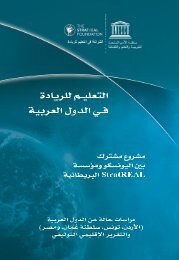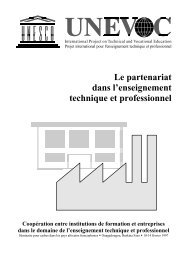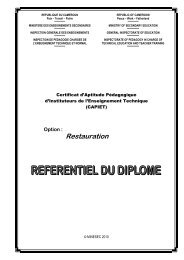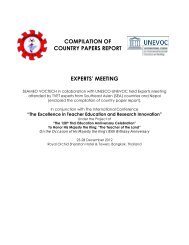Green TVET and Education for Sustainable ... - Unesco-Unevoc
Green TVET and Education for Sustainable ... - Unesco-Unevoc
Green TVET and Education for Sustainable ... - Unesco-Unevoc
You also want an ePaper? Increase the reach of your titles
YUMPU automatically turns print PDFs into web optimized ePapers that Google loves.
Contribution of Snow, Rain & Glaciers<br />
in Upper Indus Basin Flows<br />
Location<br />
River Indus Above<br />
Tarbela<br />
River Jhelum Above<br />
Mangla<br />
River Kabul Above<br />
Nowshera<br />
Snow<br />
(%)<br />
Rain<br />
(%)<br />
Glaciers<br />
(%)<br />
30-35 5-10 60-80<br />
65 35 -<br />
20-30 20-30 30-50<br />
Source: Reported By Snow & Ice Hydrology, Pakistan.<br />
Pakistani Water Resources<br />
It was identied that Pakistan is in need of good<br />
water management to tap the vast potential of its<br />
water resources <strong>for</strong> commercial, agricultural <strong>and</strong><br />
social purposes. It is emphasized that a <strong>Green</strong> <strong>TVET</strong><br />
by integrating green practices on <strong>TVET</strong> is a crucial<br />
factor in achieving a green environment, green health<br />
<strong>and</strong> green country vision of Pakistan.<br />
Sri Lanka<br />
Dr. Hewage Chithral Ambawae,<br />
Director General, Department<br />
of Technical <strong>Education</strong> <strong>and</strong> Training, in his<br />
presentation reiterated the benets brought by Sri<br />
Lanka’s richness in natural resources. In particular,<br />
the water system has been in place <strong>for</strong> over 100 years<br />
<strong>and</strong> has been exp<strong>and</strong>ed <strong>and</strong> rehabilitated several<br />
times. Still, major problems remain like leakages<br />
<strong>and</strong> adverse eects brought by ageing infrastructure.<br />
To augment this dierence, several programs in<br />
cooperation with donor agencies have been done<br />
to improve the delivery of water services. Aside<br />
from the replacement of ageing pipes <strong>and</strong> defective<br />
meters, it also aims to study the recommended<br />
methodologies <strong>and</strong> programs <strong>for</strong> the reduction of<br />
UFW <strong>and</strong> design courses in ESF <strong>and</strong> HRD that will<br />
train technicians who will h<strong>and</strong>le the works such as<br />
consumer metering, organization, etc.<br />
Increase in Supplied Water Quantity<br />
Projected Dem<strong>and</strong> in Sri Lankan Water Consumption<br />
is initiative will not only ensure safe <strong>and</strong> accessible<br />
water to the citizens of the isl<strong>and</strong> but also pave a way<br />
<strong>for</strong> a sustainable future by the assurance that the<br />
future generations will still receive the same quality<br />
of water that their ancestors enjoyed.<br />
INTERNATIONAL EXPERTS MEETING<br />
ON <strong>TVET</strong> AND ESD: APPROACHES AND<br />
IMPLEMENTATION SCHEMES IN THEORY<br />
AND PCTICE<br />
In addition, International Experts Meeting on <strong>TVET</strong><br />
<strong>and</strong> ESD was held at Magdeburg, Germany from<br />
September 16-17, 2010. It was focused on Mid-term<br />
review of DESD. e event was opened by Ms. Naing<br />
Yee Mar, UNESCO-UNEVOC <strong>and</strong> Dr. Shyamal<br />
Majumdar. In his opening, delivered a presentation<br />
on “Moving into the Second Half of the UN DESD-<br />
Implications <strong>and</strong> strategies. He highlighted three<br />
challenges to overcome the limitation highlighted by<br />
Mid-term review of DESD. First challenge is Meaning<br />
<strong>and</strong> Scope of ESD. ere is need to underst<strong>and</strong> that<br />
SD is a holistic concept. Second challenge is Model<br />
to integrate SD in <strong>TVET</strong> curriculum. He suggested<br />
three dierent models namely Infusion, Diusion<br />
<strong>and</strong> Hybrid model <strong>for</strong> integration of SD in <strong>TVET</strong><br />
curriculum. e third challenge is How to integrate<br />
SD in <strong>TVET</strong> institutions. <strong>Green</strong>ing <strong>TVET</strong> framework<br />
was highlighted to integrate SD in <strong>TVET</strong> institutions.<br />
He highlighted the ve pillars such as <strong>Green</strong> campus,<br />
green technology, green education & community<br />
outreach program green research <strong>and</strong> green culture.<br />
Lastly, he also shared insight on initiatives at CPSC<br />
on integrating green principles to promote green<br />
<strong>TVET</strong>.<br />
Dr. Majumdar, highlighted that to realize sustainable<br />
economic growth, it is imperative to develop green<br />
<strong>TVET</strong>, which deals with a resource-conserving <strong>and</strong><br />
environment-friendly mode of production, the<br />
way of life <strong>and</strong> mode of consumption, <strong>and</strong> strikes a<br />
balance among economic growth, social progress<br />
<strong>and</strong> environmental protection. We should take into<br />
consideration the need <strong>for</strong> both immediate growth <strong>and</strong><br />
long-term development. While restoring economic<br />
growth, we should optimize the energy mix, upgrade<br />
industries, develop green economy, <strong>and</strong> foster new<br />
growth areas, thus creating conditions <strong>for</strong> sustainable<br />
economic growth. Developed countries should<br />
provide nancial, technological <strong>and</strong> capacity-building<br />
support to developing countries <strong>and</strong> enable them to<br />
get access to climate friendly technologies in order<br />
<strong>for</strong> such technologies to beer serve the common<br />
interests of humankind. Developing members should,<br />
International Experts Workshop on<br />
<strong>Green</strong> <strong>TVET</strong> <strong>and</strong> <strong>Education</strong> <strong>for</strong> <strong>Sustainable</strong> Development: Capacity Development Needs <strong>for</strong> Water <strong>Education</strong><br />
September 13-17, 2010 | Munich, Germany<br />
| 17



